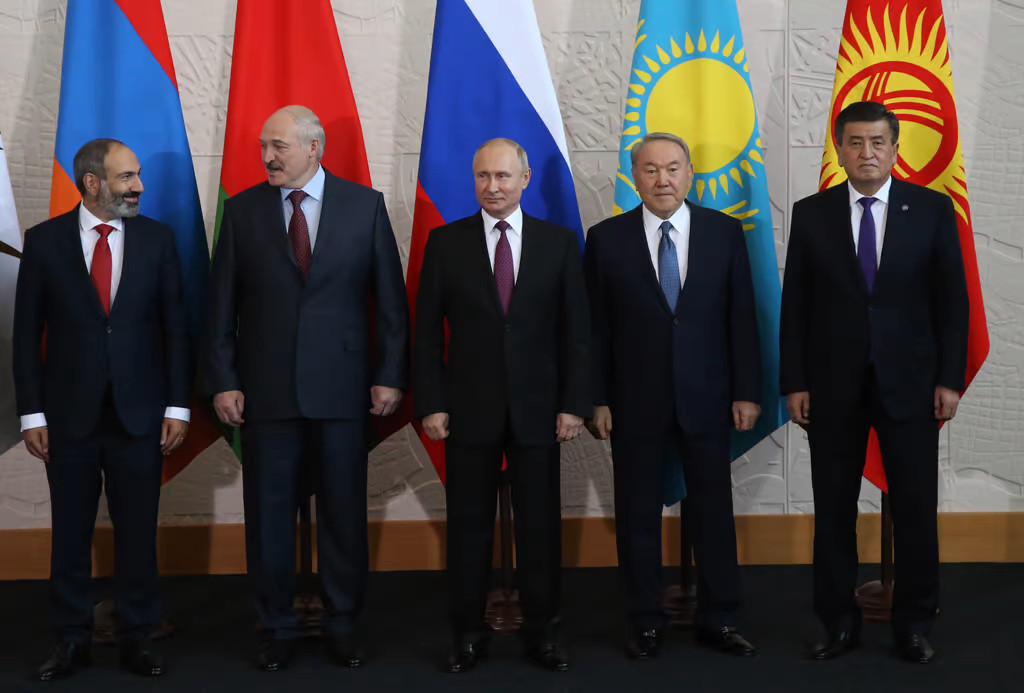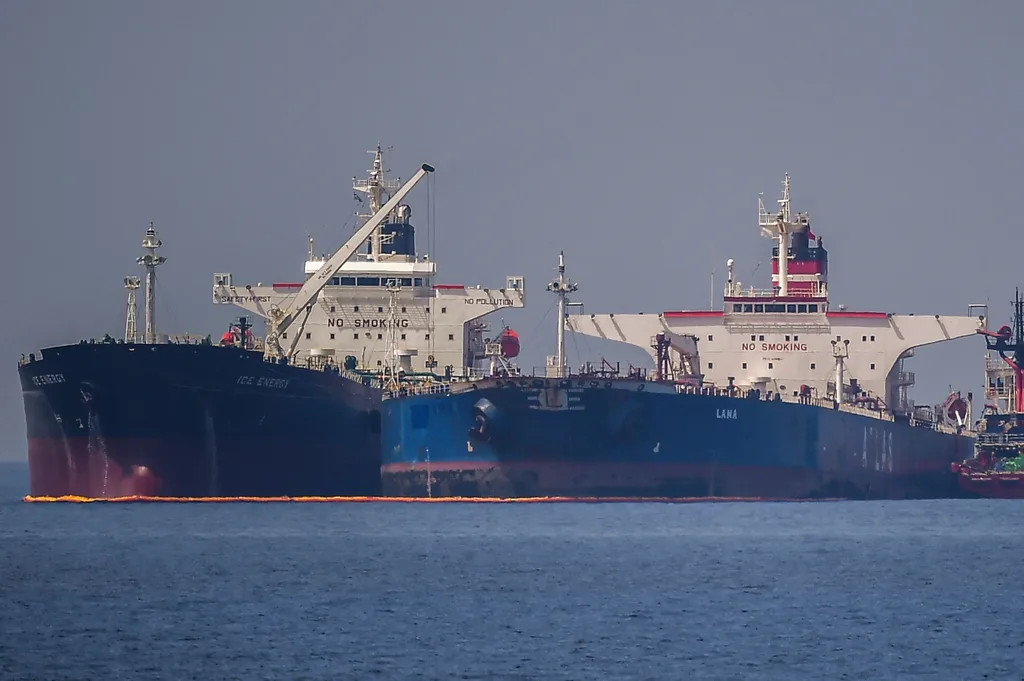
OVERVIEW
MANAGEMENT
PERFORMANCE
POSSIBILITIES
CAPITALS
ACTIVITIES
ACTORS
BURGESS
|
SANCTIONS
SANCTION BUSTING Smugglers’ secrets: How Russia can beat EU sanctions ... It’s only a matter of time before Russia starts pulling tricks on ships at sea and sending goods via friendly countries to avoid and evade sanctions. 
Original article: https://www.politico.eu/article/smuggler-secret-russia-beat-eu-sanction/ Peter Burgess COMMENTARY Smuggling has been a big part of history. I am sure that part of the reason for this is that commerce has been in play for thousands of years, and those in power have taxed it as soon as they realized its revenue potential. In the present situation with the Ukraine War and sanctions on many Russian people and organizations is causing commercial disruption, and it comes as no surprise that the art of smuggling is in demand. Back in the 1970s I was the CFO of an international shrimp fishing company. Previously I had been CFO of a land based company, and I recall the president of the fishing company making it very clear to me that land based rules were not enforced very well as soon as one was out of sight of land. He told me this after I had suggested that our trawlers could be used to inform the local national authoritues about 'illegal fishing' in territorial waters. I was alerted to the reality that he did not want our trawlers to start 'disappearing' with all hands. There are better technologies now than in the 1970s. but many of the same rules apply ... and in many ways the stakes are much higher now than in the past, with national actors now having interest in the outcomes. The days of 'Britannia ruling the waves' and 'Pax Britannica' are long gone, and the high seas beyond the reach of land based power are now much more like the old 'Wild West'. Sanctions against Russian interests in response to the Russian aggression in Ukraine are a reasonable 'Western' response, but getting all the critical actors to respect the sanctions is not in any way 'for sure'. There is a lot of money at stake ... and this can be a huge incentove for bad behavior. Sadly !!!!!!!! Peter Burgess | ||
|
Smugglers’ secrets: How Russia can beat EU sanctions
It’s only a matter of time before Russia starts pulling tricks on ships at sea and sending goods via friendly countries to avoid and evade sanctions. TOPSHOT-FRANCE-UKRAINE-RUSSIA-CONFLICT-SHIPPING-TRANSPORT Moscow is likely to try to import restricted goods through new trade routes, using torturous methods to avoid or evade western scrutiny | François Lo Presti/AFP via Getty Images BY SARAH ANNE AARUP AND CRISTINA GALLARDO June 21, 2022 8:59 pm Europe has deployed an unprecedented arsenal of economic sanctions against Moscow in an attempt to weaken Russia’s economy and force Vladimir Putin to abandon his war in Ukraine. But as the export bans bite over the coming months, Russia will start to crave banned goods that are essential for its military and domestic economy. The Kremlin will also want to replenish its war chest with revenue from sales of sanctioned products — from coal and oil to caviar — to willing buyers overseas. That means, sooner or later, Moscow will go sanctions busting. “In my country, we believe that everything should be waterproof so that there won’t be any possibility to smuggle in anything,' a senior EU diplomat said. 'But ... we are realists and we know that if there are the sanctions, then there are always people around who want to circumvent them … It’s not possible to fix up absolutely everything.' What will Russia want? Since Russia annexed Crimea in 2014, prompting a first wave of sanctions, Moscow has worked to boost its self-sufficiency, but it hasn’t been possible in all areas. It is easier to make your own cheese than to self-produce microchips, for example. That means Russia will need Western-made tech and machinery as sanctions hit supplies. These items are vital for both military and civilian use, as well as to maintain exports of oil and gas to countries like India where they are not banned. “Russia desperately needs chips, semiconductor components and several key critical raw materials like lithium, to continue manufacturing weapons systems and electric accumulators needed for military use,” a former Ukrainian trade official said. “Without these sophisticated supplies, the Russian military industry will be effectively crippled.” Russia is reliant on Western input for oil and gas infrastructure, which makes a recent ban on exporting liquefied natural gas (LNG) equipment particularly problematic for Moscow. “The dependency is very high,” said Maria Shagina, who’s a Research Fellow at the International Institute for Strategic Studies. Where will Russia get it? Moscow is likely to try to import restricted goods through new trade routes, using torturous methods to avoid or evade Western scrutiny. The list of countries seen as potential weak spots for sanctions enforcement and compliance is varied and Putin will find willing partners deep inside Europe and beyond. “Historically, there are a couple of jurisdictions that have proven themselves to be on the front lines” of sanctions evasion, a former senior sanctions official at the U.S. Treasury said. “Turkey and the UAE are pretty key in that regard.” Turkey, which benefits from privileged access to the EU market via the customs union, is not aligned with EU sanctions in the way Switzerland and Norway are. Then there are Russia's neighbors in the Eurasian Economic Union — which comprises Russia, Belarus, Kazakhstan, Armenia and Kyrgyzstan. Former Western intelligence officials told POLITICO that there could be increased regular trade in the area, which Kazakhstan is publicly encouraging. But a surge in normal trade could also come with flows of illicit sanctioned goods. 
LR: Armemian Prime Minister Nikol Pashinyan, Belarussian President Alexander Lukashenko, Russian President Vladimir Putin, Kazakh President Nursultan Nazarbayev, Kyrgyz President Sooronbay Jeenbekov pose for a photo during their bilateral meeting prior to the Eurasian Economic Union (EAEU) Summit May 14, 2018 in Sochi, Russia | Mikhail Svetlov/Getty Images “Here in Kyrgyzstan, Russians working in the IT sector have arrived in large numbers. But [I learned after] hanging out in the bars of Bishkek that not all of them are here for political reasons. Some have 'fled' with their employer's blessing to circumvent sanctions,” Associate Professor Kevin Limonier at the French Institute for Geopolitics tweeted. Shagina thinks that “Kazakhstan does care about its international reputation” because it still wants to attract business from China and the West, but “if some company in Kyrgyzstan doesn’t care” about getting cut off from the U.S. market via secondary sanctions, it could enter the lucrative sanctions avoidance business. Weak links in Europe Moscow could also look for the easiest export controls around the EU. That’s because within the bloc, each country has its own national customs and sanctions enforcement, so some jurisdictions are softer than others. As an example, Shagina cited Italy, where there were “a lot of cases” of prohibited goods almost shipped to Russia after the 2014 sanctions. Ships “with links to Germany, Italy, Greece, and Bulgaria” also docked at sanctioned Crimean ports, she said. And EU countries haven't historically been that harsh on sanctions dodging. For instance, after Siemens shipped gas turbines to Russia in 2015 and 2016 that ended up in Crimea, prosecutors reportedly investigated some Siemens employees but there have been no public reports about the investigation's conclusions. 'We haven’t heard so far anything about any legal consequences of this [Siemens] breach,' said European lawmaker Anna Fotyga, who's a former foreign minister of Poland. 'On the contrary, Siemens for years kept shares in the company responsible for installation unchanged ... These attitudes were possible because it fully converged [with] Berlin’s Russia policy.' She added that the Commission was 'very benign in assessing this case.' A Siemens spokesperson responded by saying that 'as a company, we are not seen as defendants and we never were,' adding that 'the proceedings ... relate to individuals (in part former employees),' and the company supports the sanctions. Smugglers on the seas As well as cutting off supplies of much-needed foreign kit, sanctions are intended to shrink the European market for Russian exports. Moscow will need to continue exporting commodities like oil, coal, minerals and grains to feed into its war economy and fund its invasion of Ukraine. Experts warn that Putin could find wily ways to keep selling petrol, or other sanctioned commodities like coal, to the bloc. EU countries agreed on June 3 to block Russian oil shipments to the EU by the end of this year, meaning that the clock is ticking for Russia to reshuffle its oil exports. One common trick is to use ship-to-ship transfers, where, for example, a Russian vessel in international waters offloads oil to a second tanker, which then docks in an EU port and labels the oil as coming from a country that isn’t under sanctions. Another ruse involves vessels turning off their location trackers to hide their activities. There has been a sharp increase in this practice, which is legal, by Russian tankers since the invasion of Ukraine. And although scientists can, in principle, determine where oil comes from based on geochemical analysis, “if you're blending things and hiding where it comes from, there's certainly a plausible deniability issue,” the former senior sanctions official said. “Kazakhstan oil and Russian oil are quite similar, not surprisingly.” 
The Liberian-flagged oil tanker Ice Energy (L) transfers crude oil from the Russian-flagged oil tanker Lana (R) (former Pegas), off the shore of Karystos, on the Island of Evia, on May 29, 2022 | Angelos Tzortzinis / AFP Historically, EU enforcement of sanctions has been much weaker than in the U.S., but in March the European Commission launched an online whistleblowing portal to encourage people to report suspected violations. Crime and punishment The bloc has also set out plans to make breaking sanctions against Russia a crime, to make it easier for EU governments to seize the assets of companies and individuals dodging the rules. A novel initiative is also under way to coordinate customs regimes across the bloc, dubbed “Operation Oscar.” The aim is to join up the work of Europol, Frontex and Eurojust but, ultimately, its success will depend on the efforts of individual countries’ law enforcement authorities. Experts point to Hungary, Bulgaria and the non-EU Balkans — including Russia-friendly Serbia — as potential weak links when it comes to enforcement. POLITICO contacted the customs authorities of France, Poland, Austria, Belgium, Malta and Bulgaria. None replied to our questions, apart from Bulgarian customs, which said that “there are currently no frequent attempts to avoid the sanctions,” and “the Bulgarian Customs Administration strictly applies the sanctions as currently imposed.” Despite renewed efforts to clamp down on evasion, the chances are that complicit or complacent governments and businesses will continue to provide Putin with what he wants. But even if Russia continues to import forbidden goods, Moscow will still have to pay to find suitable workarounds. Countries that facilitate Russia’s trade flows “know how to do business,” said Francesco Giumelli, a sanctions expert at the University of Groningen in the Netherlands. “They will price it in.” Doug Palmer and Lili Bayer contributed reporting. This article is part of POLITICO Pro ... The one-stop-shop solution for policy professionals fusing the depth of POLITICO journalism with the power of technology
| The text being discussed is available at | https://www.politico.eu/article/smuggler-secret-russia-beat-eu-sanction/ and |